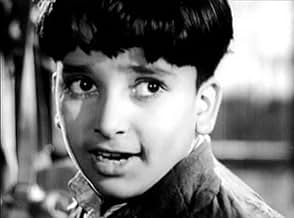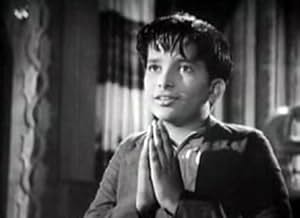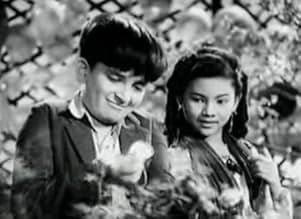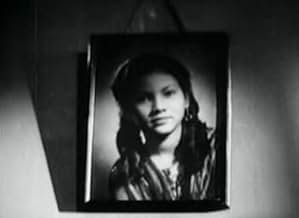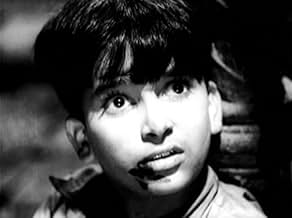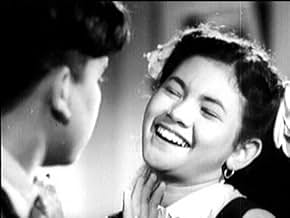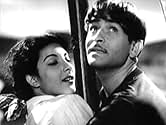Awaara
- 1951
- 2h 48min
VALUTAZIONE IMDb
7,8/10
4812
LA TUA VALUTAZIONE
Esplora il dibattito natura-contro-educazione. Il figlio di un bandito finirà sempre per essere un criminale?Esplora il dibattito natura-contro-educazione. Il figlio di un bandito finirà sempre per essere un criminale?Esplora il dibattito natura-contro-educazione. Il figlio di un bandito finirà sempre per essere un criminale?
- Premi
- 1 candidatura in totale
Prithviraj Kapoor
- Justice Raghunath
- (as Prithviraj)
Shashi Kapoor
- Young Raj
- (as Shashiraj)
Brij Mohan Vyas
- Dubey (Rita's Father)
- (as B.M. Vyas)
Leela Mishra
- Mr. Raghunath's Sister-In-Law
- (as Leela Misra)
Recensioni in evidenza
Musicals in America in their heyday were mostly about the lives of prominent show business personalities or small town middle class Americana, never about the outcast or the urban slum dweller. This is not the case with the films of Indian director, Raj Kapoor, especially in Awaara, a 1951 film and the later Boot Polish. These films call attention to the less fortunate and, in the case of Awaara, the vagabond whose life of crime is the inevitable outcome of growing up in the slums.
In Awaara, Kapoor's real father (Prithviraj Kapoor) plays a heartless judge who accuses his pregnant wife (Leela Chitnis) of infidelity after she was kidnapped by bandits and throws her out of his home (the logic of this eludes me since she was already pregnant when kidnapped). The stern judge staunchly believes that a thief's son will always be a thief and a good man's son will always turn out good. In a series of flashbacks, the film dramatizes the unfortunate consequences of this belief system. Raju, played by the director Raj Kapoor as an adult and by his brother Sashi Kapoor as a child, is born on the streets and grows up in the slums.
Under the guidance of a ruthless bandit named Jagga (K. N. Singh), he turns to stealing to help support his mother. Raj has little to comfort him except for a picture hanging on the bare walls of his house of Rita, his childhood sweetheart played by the stunning Nargis, a real life lover of Kapoor. The romance between Raj and Rita is one of the central motifs of the film and the chemistry between the two is electric. This is especially evident in the boat scene where she performs an exotic dance to the Dum Bhar song, and after she calls him a junglee (savage) and he slaps her in an incident that serves to bring them closer together.
Raju, the tramp, is forced to live on his wits but does so with humor and a Chaplinesque charm. When he finds out the true circumstances of his childhood, however, he sets out to get revenge against his father, the judge, and ends up facing a charge of attempted murder in the judge's own courtroom. Rita, a lawyer herself, defends him as she promised she would years ago. She puts the judge on the witness stand and asks pointed questions about how he condemned his wife and child to a lifetime of poverty. Rita holds him and society responsible for the conditions that led Raju to commit his crime and asks the judge to forgive him and admit that Raju is his son. Raju, in turn, offers an impassioned plea to the court to punish him as a criminal but not to neglect the conditions that gave rise to his life of crime. In the end, a very moving scene of attempted reconciliation between father and son had me wiping away the tears.
Awaara is reminiscent of both 40s film-noir with its dark cobblestone streets and menacing shadows and, in its social conscience, of the great Italian neo-realists like de Sica. But basically, Awaara is still in the Bollywood tradition; that means drama, romance, music, comedy, and action -- all put together in a total package to appeal to a wide audience. With great songs and dances, amazing dream sequences, style and panache, strong drama, and an inspiring message, it is not surprising that Awaara became one of the most popular films in Indian cinematic history. It is one of my favorites as well.
In Awaara, Kapoor's real father (Prithviraj Kapoor) plays a heartless judge who accuses his pregnant wife (Leela Chitnis) of infidelity after she was kidnapped by bandits and throws her out of his home (the logic of this eludes me since she was already pregnant when kidnapped). The stern judge staunchly believes that a thief's son will always be a thief and a good man's son will always turn out good. In a series of flashbacks, the film dramatizes the unfortunate consequences of this belief system. Raju, played by the director Raj Kapoor as an adult and by his brother Sashi Kapoor as a child, is born on the streets and grows up in the slums.
Under the guidance of a ruthless bandit named Jagga (K. N. Singh), he turns to stealing to help support his mother. Raj has little to comfort him except for a picture hanging on the bare walls of his house of Rita, his childhood sweetheart played by the stunning Nargis, a real life lover of Kapoor. The romance between Raj and Rita is one of the central motifs of the film and the chemistry between the two is electric. This is especially evident in the boat scene where she performs an exotic dance to the Dum Bhar song, and after she calls him a junglee (savage) and he slaps her in an incident that serves to bring them closer together.
Raju, the tramp, is forced to live on his wits but does so with humor and a Chaplinesque charm. When he finds out the true circumstances of his childhood, however, he sets out to get revenge against his father, the judge, and ends up facing a charge of attempted murder in the judge's own courtroom. Rita, a lawyer herself, defends him as she promised she would years ago. She puts the judge on the witness stand and asks pointed questions about how he condemned his wife and child to a lifetime of poverty. Rita holds him and society responsible for the conditions that led Raju to commit his crime and asks the judge to forgive him and admit that Raju is his son. Raju, in turn, offers an impassioned plea to the court to punish him as a criminal but not to neglect the conditions that gave rise to his life of crime. In the end, a very moving scene of attempted reconciliation between father and son had me wiping away the tears.
Awaara is reminiscent of both 40s film-noir with its dark cobblestone streets and menacing shadows and, in its social conscience, of the great Italian neo-realists like de Sica. But basically, Awaara is still in the Bollywood tradition; that means drama, romance, music, comedy, and action -- all put together in a total package to appeal to a wide audience. With great songs and dances, amazing dream sequences, style and panache, strong drama, and an inspiring message, it is not surprising that Awaara became one of the most popular films in Indian cinematic history. It is one of my favorites as well.
This movie is itself a legend. In 1988 TRT (Turkish national television) was to show that film. As I was a little child I could not now about the movies but that day my mother, grandmother, my uncles wife all got together and prepared delicious foods, and watched that movie on TV. Perhabs on that day all women in Turkiye were watching that film.
Mavi Boncuk, a delicious movie has reference to this film. On that movie Munir Ozkul says: - Aaah Awaara (at the time he looks to Awaara's poster) I've grown my children by selling it's tickets, played for 6 months on those days.
It is a fact that Awaara was a great success, on those days a film was playing for only a week but Awaara was in vision for 6 great months. I only remembered a scene from the film I watched when I was 6 years old, this is the scene that Raju stole a watch. Then 3 years ago I bought this film and watched with friends, my friends were very impressed with the movie, and we watched again and again.
Awaara is a milestone for Turkish cinema, it is filmed again by great Turkish actor Sadri Alisik in 1966. Arabesk is stated to enter Turkiye with Awaara. Adalet Cimcoz and Ferdi Tayfur spoke Nargis and Raj Kapoor in Awaara's Turkish dubbing version and film is great with that excellent dubbing.
Films song is also sung in Turkish lyrics by Sadri Alisik and song was also a hit.
Mavi Boncuk, a delicious movie has reference to this film. On that movie Munir Ozkul says: - Aaah Awaara (at the time he looks to Awaara's poster) I've grown my children by selling it's tickets, played for 6 months on those days.
It is a fact that Awaara was a great success, on those days a film was playing for only a week but Awaara was in vision for 6 great months. I only remembered a scene from the film I watched when I was 6 years old, this is the scene that Raju stole a watch. Then 3 years ago I bought this film and watched with friends, my friends were very impressed with the movie, and we watched again and again.
Awaara is a milestone for Turkish cinema, it is filmed again by great Turkish actor Sadri Alisik in 1966. Arabesk is stated to enter Turkiye with Awaara. Adalet Cimcoz and Ferdi Tayfur spoke Nargis and Raj Kapoor in Awaara's Turkish dubbing version and film is great with that excellent dubbing.
Films song is also sung in Turkish lyrics by Sadri Alisik and song was also a hit.
This is a classic Bollywood movie and seminal Raj Kapoor - Nargis vehicle, forcing home to the audience all manner of stereotypes, prejudices and assumptions before systematically dismantling them all with a sledgehammer. It was another of RK's successful and respectful attempts at mass entertainment mixed with mass education, generations later it's all so obvious that unfortunately we can lose sight of how much good it did at the time and just how well-intentioned it was.
I was watching the colourful Suraj a while ago and was reminded of old black and white Awara which I hadn't seen in decades – it's another take on once a bandit's son always a bandit's son; or, Blood vs Destiny. Delinquent wastrel and felon Raj is the kicked about son of a strict old-fashioned judge (played by Prithviraj) which neither of them realise, he and childhood friend Nargis who is now the judge's ward fall in love and, well, it spirals out of control for everyone. Is it Nature or is it Nurture that has made him a proud tramp? Some lovely noirish photography and atmospheric flashback scenes complement a melodramatic storyline, and there's even time for an admirable dream/nightmare sequence. It's a marvellous, if very contrived film with plenty of ideas, some tremendous images and great music by Shankar - Jaikishan as it is but as usual for me whenever the incomparable Lata sings it's turned into something even more special. Favourite bits: Nargis never looked lovelier or more iconic throughout but Aa Jao Tadapte Hain Arman with RK stroking her hair takes top prize; the literally dreamy and fascinating Tere Bina Aag Yeh Chandni; and RK does his anthem Awara Hoon too. According to Lata it took a whole night to record the music for the dream sequence.
So many sincere films made over the last 50 years have no morality, at the most charitable most don't even know the meaning of the word; so what's so bad about a film having too much? Nothing wrong at all with Good beating Evil! Imho, even though poverty still breeds crime while Our Betters still deny it, Raj Kapoor's finest film.
I was watching the colourful Suraj a while ago and was reminded of old black and white Awara which I hadn't seen in decades – it's another take on once a bandit's son always a bandit's son; or, Blood vs Destiny. Delinquent wastrel and felon Raj is the kicked about son of a strict old-fashioned judge (played by Prithviraj) which neither of them realise, he and childhood friend Nargis who is now the judge's ward fall in love and, well, it spirals out of control for everyone. Is it Nature or is it Nurture that has made him a proud tramp? Some lovely noirish photography and atmospheric flashback scenes complement a melodramatic storyline, and there's even time for an admirable dream/nightmare sequence. It's a marvellous, if very contrived film with plenty of ideas, some tremendous images and great music by Shankar - Jaikishan as it is but as usual for me whenever the incomparable Lata sings it's turned into something even more special. Favourite bits: Nargis never looked lovelier or more iconic throughout but Aa Jao Tadapte Hain Arman with RK stroking her hair takes top prize; the literally dreamy and fascinating Tere Bina Aag Yeh Chandni; and RK does his anthem Awara Hoon too. According to Lata it took a whole night to record the music for the dream sequence.
So many sincere films made over the last 50 years have no morality, at the most charitable most don't even know the meaning of the word; so what's so bad about a film having too much? Nothing wrong at all with Good beating Evil! Imho, even though poverty still breeds crime while Our Betters still deny it, Raj Kapoor's finest film.
When I was little, my grandmother often told me about a movie from her younger ages - Awaara /released as Bradyaga/. She was always telling me, that when it came to Bulgaria it was a total hit. People watched it more that 20 times! (especially the gypsies, who thought of Indian people as their ancestors). If I ask somebody, who is over 50 year old about that film, I am sure, that he will remember it. And when the main actor - Raj Kapoor visited the country, thousands of people traveled to see him. My grandma, who was one of the best portrait photographers at that time and was asked to make his pictures with the leaders of the country, remembers that he and his wife never acted like international movie stars. They met with ordinary people, visited hospitals and orphanages. Why was that film so special? Especially in Bulgaria - a country on a Balcan peninsula with such a different culture from India? First of all, it was so different from the Soviet films that were broad-casted at that time. It was full of life, passion, love, music, and nevertheless - it was a social film - about the problems of the different classes. And it made a country so far away close. It was the first step for the good relationships between our two countries. A few years ago I have the chance to watch this movie. And I can tell, its messages are still up to day. Something that you can tell for every really good film. Watch it, you will not regret it.
in the East of Europe, under the Comunist regime, the Indian films have had a special status. as alternative to the Soviet movies and propaganda shows. but, in same measure, for the social message. clear . for romanticism and music and charm of actors and dramatic situations. but Awaara was more than a successful Indian film. it was, and remains, an epic. because it gives the right perspective about ordinary, every day situations. because it reminds the joy of life and the deep pain.because it is , like the childhood fairy tales, story of courage and self determination and love difficulties , sacrifice and happiness. because it is nice and bitter and translation in image of known situations. and, sure, for Raj Kapoor. in the East , the Indian film was an open window. Awaara was, for years, one of the most convincing examples.
Lo sapevi?
- QuizIn Awaara, there are three genaration of the Kapoor family in the film. There is Deewan Kapoor in the film, who was the grandfather of Raj Kapoor (father of pritviraj ) who plays the role of judge, who comes in the beggining of the film and in the end, then Raj Kapoor's father, Pritviraaj and also his young brother, Shashi Kapoor (junior raj kapoor ) were also in this film. As a filmaker this was Raj Kapoor, his third film. This film got very famous in Russia. In a outdoor scene of Raj with Nargis, in the background, the music of the song ' na mangu sona chandi' could be heard there, 20 years later this tune was used in a song of. Bobby.
- ConnessioniFeatured in Century of Cinema: And the Show Goes On: Indian Chapter (1996)
- Colonne sonoreAwara Hoon
Sung by Mukesh
Music composed by Shankarsingh Raghuwanshi and Jaikishan Dayabhai Panchal (as Shankar-Jaikishan)
Lyrics by Shailendra
I più visti
Accedi per valutare e creare un elenco di titoli salvati per ottenere consigli personalizzati
- How long is Awaara?Powered by Alexa
Dettagli
- Tempo di esecuzione
- 2h 48min(168 min)
- Colore
- Proporzioni
- 1.37 : 1
Contribuisci a questa pagina
Suggerisci una modifica o aggiungi i contenuti mancanti


